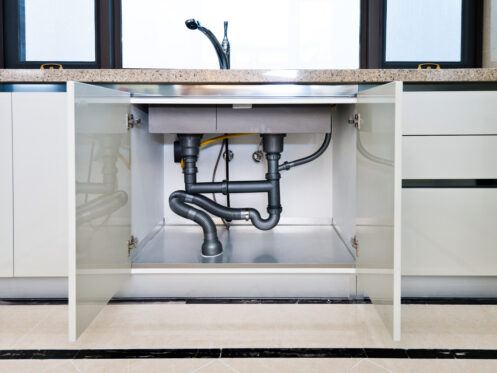Repiping a house is a process that involves taking out the old pipes and replacing them with an all-new plumbing system. Often, it’s more cost-effective than repairing your pipes bit by bit as problems spring up. Repiping your home can also save you from the hassle of regular leaks and repair calls. A professional plumber can advise you on whether repiping is the best choice, but the following signs may encourage you to start thinking in that direction.
1. Leaking Pipes
Sometimes, a leaky pipe is no big deal. You can have it professionally repaired and then move on with your life. Not all leaks are so benign, though. In many cases, a leak may be a sign that a major plumbing issue is brewing.
Pipes don’t last forever. Older pipes can start to develop problems that lead to leaks in one or more places. Whether the leaks are happening at joints or along the length of the pipes, you should pay attention to what they’re telling you about the state of your plumbing. It’s possible that it’s time to consider a repiping project.
Some leaks are fairly easy to spot. For example, if a pipe that runs through your basement starts to drip, you may notice a puddle. Other leaks tend to hide. It can be harder to tell if you have a leak within the floor, the ceiling, or a wall. Pay attention, then, to the more obvious leaks. They can often clue you in on the fact that your plumbing is starting to fail overall. Even one leak in an older pipe could be a reason to talk to a plumber about repiping.
2. Corrosion on the Pipes
Many older plumbing systems use galvanized steel pipes. This material is prone to corrosion as it ages. Corrosion is often visible on the outside of the pipes, particularly at the joints. It often shows up as rust. You might notice that the metal is peeling or turning a different color.
Corrosion can seriously compromise the strength of your pipes. As the metal breaks down, the pipes will begin to leak. It’s best not to let the situation get to that point. Instead, you should consider replacing your pipes before you end up with a mess on your hands.
3. Poor Water Pressure
When the flow of water is restricted, low water pressure is the result. Your showers may not be as relaxing as you’d like if your pipes are full of blockages.
Over time, the inside diameter of a pipe can shrink. Limescale deposits are a common cause of pipe blockages. Hard water leaves a buildup of minerals inside a pipe. When there’s a lot of limescale, less water will be able to pass through the pipe at a time.
Corrosion can also lead to narrower pipes. As the metal corrodes, a rusty buildup may form inside the pipe. Since you can’t see inside of your pipes on your own, poor water pressure may be the first clue that your plumbing is due for a replacement.
4. Discolored Water
Corrosion inside the pipes can affect the water that flows through them. As the water passes by, it may pick up rust particles. When the water pours out of the faucet, you may quickly be able to tell that there’s a problem inside of your pipes. Instead of looking fresh and clear, the water may be a rusty brown color.
Often, the brown water only comes out for a moment. After you run the water for a bit, it turns clear. You might think that the issue is no big deal since the discoloration doesn’t continue. However, that’s not the case at all. It’s actually a rather clear indication that there’s corrosion somewhere within your pipes.
In addition to corrosion, old pipes may pass other types of sediment into your water as well. If you have discolored water of any sort, particularly brown, yellow, or red water, contact a plumber about the possibility of repiping your home.
5. Unpleasant Tastes and Smells
Sediment in your water doesn’t just affect its color. It may impact its taste and odor as well. You might quickly identify it as a rusty smell, or it may seem more questionable. Either way, it’s not a good situation.
Not only are unusual tastes and smells unpleasant, but they can also be a sign that your water isn’t doing your health any favors. You may prefer to avoid drinking the tap water until you can have your house repiped.
6. Repeated Clogs
As pipes age, they become more prone to clogging. No matter how hard you try to prevent sink and toilet clogs, they may repeatedly occur. Some older plumbing systems can even struggle to handle toilet paper.
Older pipes clog easily because their insides are deteriorating. The surface loses its smoothness. Rough bumps or pits may snag debris that flows through the pipes. The more debris that lines the walls, the harder it is for other matter to pass through the pipes.
If you’re constantly needing to pull out the plunger — or call a plumber for clog service — you will appreciate how much more cooperative new pipes can be.
7. Unusual Plumbing Noises
Water shouldn’t make loud noises as it flows smoothly through your pipes. If your plumbing is producing odd sounds, it may be time to replace it. Whether you’re hearing gurgles, creaks, or bangs, pay attention and call a Shreveport plumber. These noises could indicate a blockage in the line, or they may suggest that your pipes are weakening.
8. Water Temperature Issues
Older pipes might not deliver water at the correct temperature. Perhaps it seems that the hot water always comes out lukewarm. You may also notice that a small shift of the faucet handle results in a shockingly large temperature swing. Faulty plumbing valves can be to blame for these issues. Those will get replaced during a repiping project.
9. Advanced Age
How long your pipes are likely to last depends on their material. Some PVC pipes should be replaced after only a few decades. Cast iron pipes, on the other hand, often stay in usable form for a full century. Most pipe materials fall somewhere within that range. They often hold up for 50 to 80 years.
It’s okay if you don’t know the specific age of your pipes. The main takeaway is that repiping will be necessary at some point since no pipes last forever. If you can tell that it’s been a long time since your pipes were replaced, then it’s a good idea to consult a plumber about their status.
The plumbers at Bobby L Greene Plumbing, Heating & Cooling Co. specialize in supply lines, sewer lines, drains, water heaters, and other plumbing projects for residential and commercial customers. Our services include hydrojetting and backflow testing. Whether you need tankless water heater installation or garbage disposal repair, we encourage you to reach out to our team. As your complete home indoor comfort company, we offer heating and cooling services as well. Call Bobby L Greene Plumbing, Heating & Cooling Co. in Shreveport today for help with your next plumbing project!

